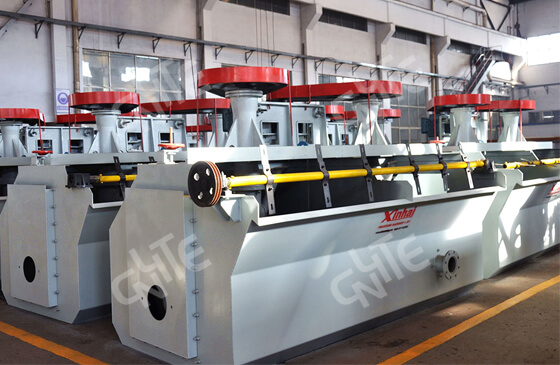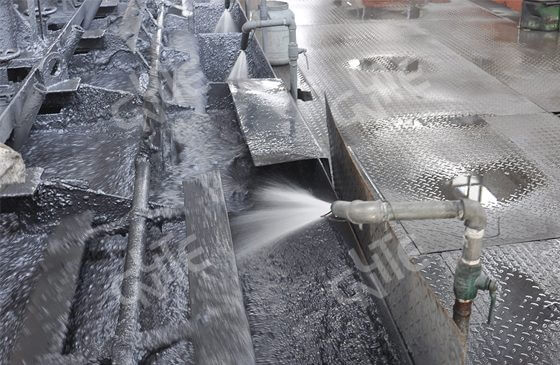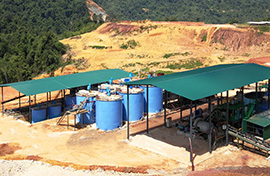-
 E-mail
guhaixin0724@gmail.com
E-mail
guhaixin0724@gmail.com
-
 Call Us
008613683147042
Call Us
008613683147042
 E-mail
guhaixin0724@gmail.com
E-mail
guhaixin0724@gmail.com
 Call Us
008613683147042
Call Us
008613683147042
 Home
Guides
Flotation Reagent Guide
Specific Effects Of Slurry Concentration, Time And Temperature On Froth Flotation
Home
Guides
Flotation Reagent Guide
Specific Effects Of Slurry Concentration, Time And Temperature On Froth Flotation
2019-12-26 Views: 7251
Warm Tip: If you want to know more information, like quotation, products, solutions, etc., please Click here ,and contact us online.

The froth flotation process will be affected by many factors, like slurry concentration, flotation time, and slurry temperature. But these factors can be adjusted to improve the flotation effect. Let's talk about the specific effects of slurry concentration, flotation time, and slurry temperature on froth flotation in the following article.
1. Indirectly affect froth flotation by affecting the flotation time.
The capacity of the froth flotation plant is constant. When the pulp concentration remains constant, the flow of pulp entering the froth flotation operation is constant. When the pulp concentration increases, the pulp flow will decrease. When the pulp concentration decreases, the pulp flow will decrease. As a result, the residence time of the pulp in the flotation machine will be extended or shortened. Therefore, the pulp concentration indirectly affects the ore recovery rate and concentrate grade by affecting the froth flotation time.
2. Indirectly affect froth flotation by affecting the volume concentration of the froth flotation agent.
The amount of froth flotation reagent is calculated by selecting how many grams of reagent are consumed for one ton of raw ore. When the dosage of unit chemical is unchanged, the change of pulp concentration will bring about the change of froth flotation chemical concentration. In froth flotation, insufficient or excessive amount of flotation reagent will affect the flotation index.
3. Indirectly affect froth flotation by affecting pulp aeration.
The concentration of the pulp will affect the aeration of the pulp. Generally, when the aeration volume is large, the processing capacity of the flotation cell will be improved, and a better flotation index will be obtained.
So, how to determine the appropriate slurry concentration?
Ore properties and froth flotation conditions can determine the size of the pulp concentration. When processing large ores with coarse grain size, a higher flotation concentration should be used. Conversely, when processing ore with small specific gravity and finer particle size, a lower flotation concentration should be used. In actual production, the concentration of froth flotation should be in the following range: 25 to 45% for rough selection, 10 to 20% for selection, and 20 to 30% for scanning.
Froth flotation time refers to the residence time of pulp in the flotation cell. The optimum flotation time for different ores is determined by conducting a froth flotation test. When the content of floated minerals is low, the floatability is good, the pulp concentration is low, the ore feeding size is appropriate, the flotation equipment is inflated strongly, and the agent action is strong, the shorter the flotation time required. Conversely, the longer the flotation time.
The froth flotation index changes with the flotation time as shown in the graph below. As the flotation time increases, the froth flotation recovery rate increases and the concentrate grade decreases. But with the increase of flotation time, the recovery rate will eventually stabilize to a fixed value.
 (The Relationship Between RIO and Grade With Flotation Time)[/caption]
(The Relationship Between RIO and Grade With Flotation Time)[/caption]In froth flotation, you can judge the flotation speed according to the flotation time. The shorter the time it takes to reach the flotation index, the faster the flotation speed. When designing a flotation plant, the number of flotation machines of the specified model is determined based on the froth flotation time; in a flotation plant that is put into production, the actual flotation time is often calculated by the operating process to determine the flotation Whether the operation is reasonable.
In the flotation plant production, the flotation time can be shortened by increasing the feed slurry concentration; when increasing the feed volume, the shortage of flotation time can be made up by increasing the pulp concentration.
Within a certain range, if you want to increase the mineral recovery rate, you can increase the flotation time by increasing the number of rough separations and the number of sweeps or the number of flotation cells; if you want to improve the concentrate grade, you can The number of flotation cells increases the selection time.
Most of the flotation plants are conducted under normal temperature conditions. However, in production practice, when flotation of sulfide ore, heating the pulp is beneficial to the effect of froth flotation. After the slurry is warmed, the buoyancy of fine-grained minerals can be improved, reducing the need for desliming. At the same time, the stirring and flotation time will be shortened, and the consumption of flotation reagent will be reduced.
 [/caption]
[/caption]There are mainly three cases of sulphide ore heating foam flotation process:
(1) Heating promotes desorption of the froth flotation reagent. Lime is added to the slurry and stirred, and the temperature increase can remove the xanthate film on the surface of the sulfide mineral. (2) Oxidative heating. Oxidation of the mineral is promoted by heating, and oxygen suppresses the mineral. (3) Reductive heating. Using reducing agents, heating can enhance the inhibitory effect on minerals by enhancing the reducing effect of the agents.
In summary, the flotation concentration, time and temperature indicators have a significant impact on froth flotation technology. In actual production, to achieve the required recovery rate, these indicators must be strictly controlled.
No. 188, Xinhai Street, high-tech Industrial Park, Fushan District, Yantai, Shandong, China.

Please leave your message here! We will send detail technical info and quotation to you!